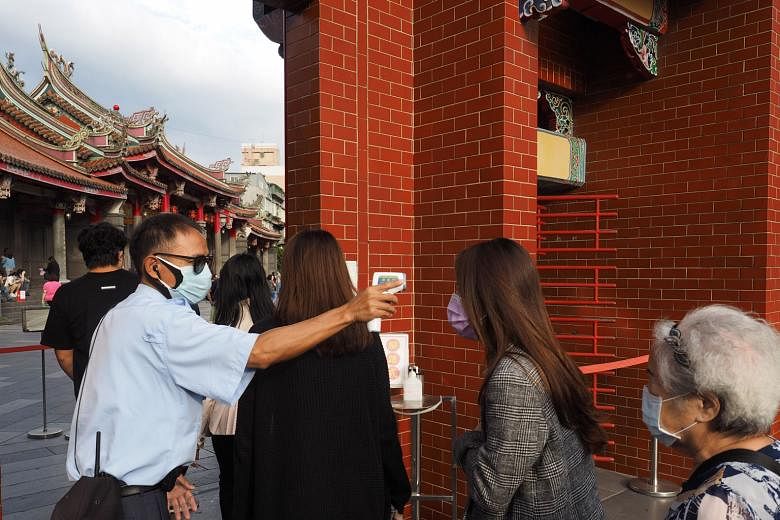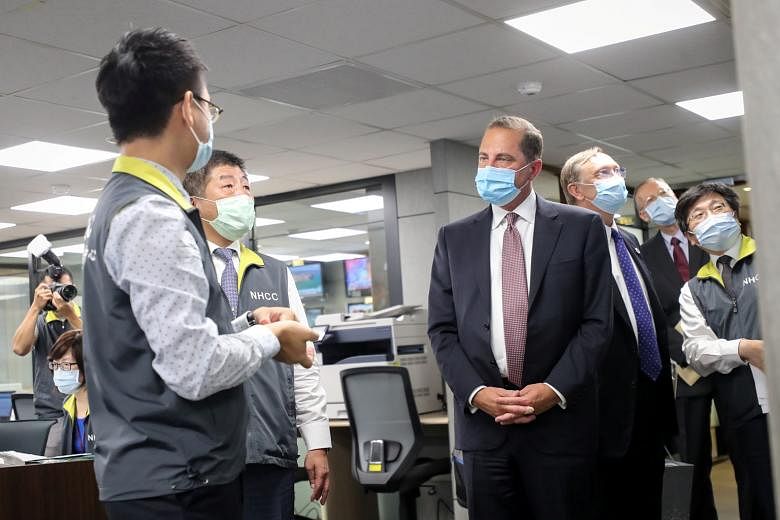TAIPEI • While many places around the world are hitting new highs in coronavirus cases, Taiwan has achieved a different kind of record - 200 days without a locally transmitted case.
Taiwan holds the world's best virus record by far and reached the new landmark yesterday, even as the pathogen explodes anew in Europe and the United States.
Taiwan's last local case was recorded on April 12; there has been no second wave.
What did this island with 23 million people do right? It has had 550 confirmed Covid-19 cases, with only seven deaths.
Experts say closing borders early and tightly regulating travel have gone a long way towards fighting the virus. Other factors include rigorous contact tracing, technology-enforced quarantine and universal mask wearing.
Further, Taiwan's deadly experience with Sars in 2003 has scared people into compliance.
Taiwan is the only major economy that has so far been able to keep community transmission of Covid-19 eliminated, said Dr Peter Collignon, an infectious disease physician and professor at the Australian National University Medical School.
Taiwan "probably had the best result around the world", he said, and it is "even more impressive" for an economy with a population about the same size as Australia's, with many people living close to one another in apartments.
Taiwan will also be among the few economies to register growth this year, with the government in August forecasting that the gross domestic product will expand 1.56 per cent in 2020.
Still, Taiwan is not out of the woods yet, as it recorded 20 imported cases in the past two weeks, mostly from South-east Asian countries such as the Philippines and Indonesia.
And others that initially fought the virus well, like Singapore and Japan, then had spikes in cases.
What countries with surging infections can take away from Taiwan's experience is that nothing works without contact tracing those who have tested positive and then quarantining them, said Dr Chen Chien-jen, the island's former vice-president and an epidemiologist, in an interview.
Also, as it is not easy to make people stay in quarantine, Taiwan has taken steps to provide meal and grocery delivery and even some friendly contact via Line Bot, a robot that texts and chats.
There is also punishment - those who break quarantine face fines of up to NT$1 million (S$48,560).
Here is how Taiwan has achieved its milestone:
1. Border control
Taiwan shut down to all non-residents shortly after the pandemic broke out in January and has kept tight control over its borders since.
"Taiwan's continual success is due to strict enforcement of border control," said Dr Jason Wang, the director of Stanford University's Centre for Policy, Outcomes and Prevention.
That includes symptom-based surveillance before travellers board flights and digital fence tracking via cellular signals to ensure their compliance with a 14-day quarantine, he said.
2. Masks, distribution
The decision to stockpile and have central distribution of face masks played a key role in Taiwan's success.
The government early in the pandemic stockpiled all domestically produced face masks and banned their export.
Within four months, companies increased production from two million to 20 million units a day, enabling the island to ration masks to residents on a regular basis.
3. Contact tracing, quarantine
Taiwan has world-class contact tracing - on average, linking 20 to 30 contacts to each confirmed case.
In extreme situations, such as that of a worker at a Taipei City hostess club who contracted the virus, the government tracked down as many as 150 contacts.
Then, all contacts must undergo a 14-day home quarantine, even if they test negative. So far, about 340,000 people have been under home quarantine, with fewer than 1,000 fined for breaking it.
That means 99.7 per cent have complied, according to Dr Chen.
"We sacrificed 14 days of 340,000 people in exchange for normal lives for 23 million people," Dr Chen said.
4. Sars experience
The painful lessons of past epidemics paved the way of Taiwan's success in fighting Covid.
It began building an emergency response network for containing infectious diseases after its experience with Sars in 2003, when hundreds became ill and at least 73 died, for the world's third-highest infection rate. Taiwan later experienced pandemics such as bird flu and influenza H1N1.
As a result, its residents are acutely aware of disease-fighting habits such as hand-washing and wearing of masks.
BLOOMBERG












